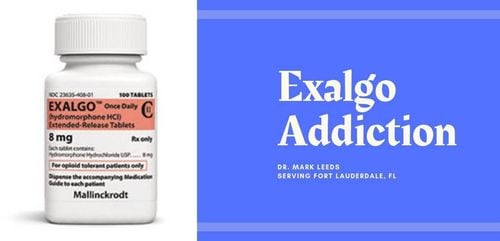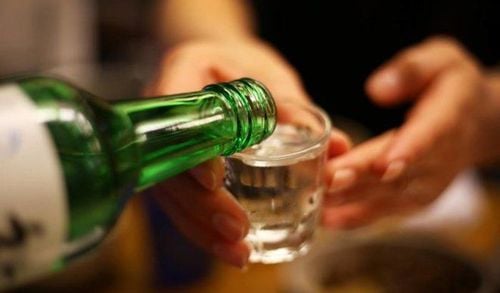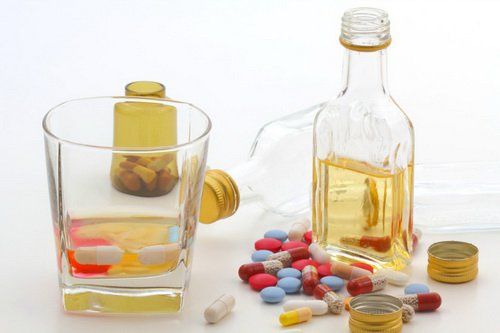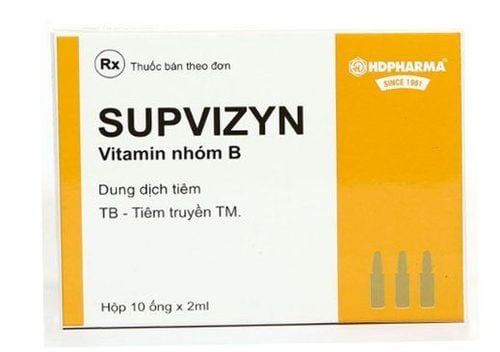This is an automatically translated article.
Alcohol causes great harm to health as well as family and work happiness. That's why it's so important to limit alcohol today. So what happens to your body when you stop drinking? Follow the article below and watch as we show you the amazing benefits of quitting drinking.
1. What is sudden cessation of drinking?
Drinking is sometimes a cultural trait, but drinking too much and for a long time leads to alcohol addiction and dependence. Alcoholism leads to many dangerous neurological and gastrointestinal complications. When suddenly stopping drinking alcohol will cause restlessness, insomnia, headache, vomiting and may even experience alcohol delirium, manifested by confusion; hallucinations or virtual images.
1.1. Symptoms of alcohol withdrawal syndrome Symptoms can appear as soon as 6 hours after alcohol withdrawal, depending on the stage of alcohol withdrawal syndrome, the patient has symptoms from mild to severe, such as shaking hands; anxiety, irritability, insomnia; vomiting, poor appetite; tachycardia , slight increase in blood pressure, increased sweating; Generalized epilepsy, severe cases may experience delirium tremens, manifested by confusion; hallucinations and virtual images; insomnia, day-night rhythm reversal; personality disorder; seizures; fever; increased heart rate, lower blood pressure; sweat a lot ; thirst, skin wrinkles... the death rate accounts for about 15% due to cardiovascular collapse, suicide or attacks on others...
1.2. Degrees of alcohol withdrawal syndrome Grade 1: Increased autonomic nervous system activity, appearing after 6 to 12 hours in all patients with abrupt withdrawal from alcohol, with manifestations of insomnia, tremors, restlessness , headache, tachycardia, stomach and intestinal disorders (vomiting, nausea, loss of appetite). Level 2: Hallucinations, usually visual hallucinations, sometimes auditory hallucinations and tactile hallucinations, appear after half a day to 1 day with a frequency of 10-25% of patients. Grade 3: Generalized convulsions appear within 12 - 48 hours with an incidence of 15% of patients. 30% of patients will progress to stage 4. Level 4: Delirium tremor, time appears after 2 - 5 days with a frequency of 5%. The mortality rate is about 15% (with or without treatment). Some risk factors such as age over 30, tachycardia, infection, history of convulsions due to alcohol cessation or delirium, trauma, surgical intervention. Alcohol also has slow effects on the brain, being considered a sedative or depressant. In long-term drinkers, the brain is likely to experience the depressive effects of alcohol on a regular basis. Over time, the brain regulates its own chemicals to compensate for the effects of alcohol. It is the production of stimulant chemicals, such as serotonin or norepinephrine (related to adrenaline) in larger than normal amounts.
If you give up alcohol suddenly (due to withdrawal), the brain is like a speeding car that loses its brakes. Most alcohol withdrawal symptoms are caused by overstimulation of the brain. The most dangerous clinical manifestation, which occurs in 1 in 20 people with alcohol withdrawal, is delirium, at which time the brain can no longer regulate the chemicals when alcohol is stopped. Delirium is a temporary state of confusion, the brain no longer controls many things like circulation, breathing. Vital signs such as heart rate and blood pressure change very suddenly and unpredictably, leading to heart failure, stroke, and death. Therefore, in order for the brain to adjust to drinking habits, it takes a long time to help the brain regain its balance.
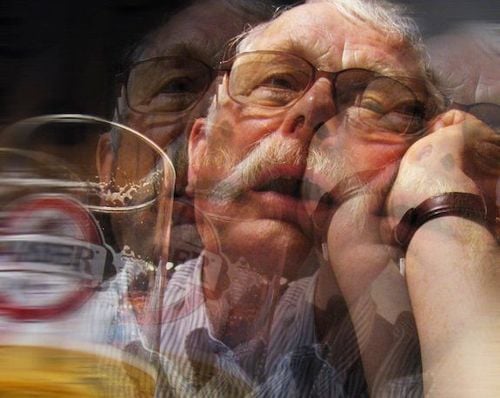
Ảo giác do ngừng uống rượu đột ngột
2. What happens to your body when you stop drinking?
2.1. You Can Avoid Accidents Alcohol plays a role in at least half of all serious injuries and deaths from burns, drowning and homicide. It is also linked to four out of 10 fatal falls and traffic accidents, as well as suicides. Even cutting your alcohol intake by a third can reduce the number of injuries and the number of sick days.
2.2. Your heart is healthier You might think that a regular glass of red wine or another alcoholic beverage might be good for your heart. But that may not be true, or only for those who like to drink lightly (less than one drink a day). If you use more than that, cutting back or quitting can lower your blood pressure, levels of fats called triglycerides, and your risk of heart failure.
2.3. Your liver can heal. Your liver's job is to filter out toxins. And alcohol is poison to your cells. Heavy drinking – at least 15 drinks for men and eight or more drinks for women per week – can damage organs and cause fatty liver, cirrhosis and other problems. The good news is that your liver can repair itself and even regenerate when you quit drinking.
2.4. You Can Lose Your Weight A typical beer will have about 150 calories, and a serving of wine has about 120. In addition to mostly empty calories, alcohol will increase your appetite. It also makes you more impulsive, and less likely to resist fries and other menu temptations. So, as you stay away from alcohol, the numbers on your scale may start to drop.
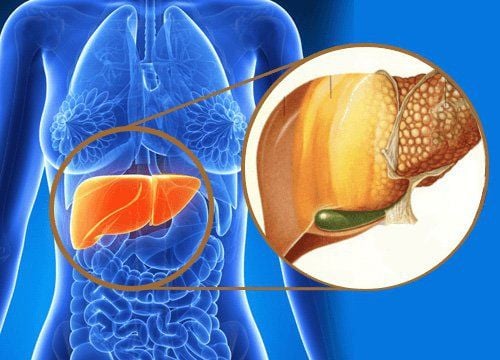
Gan sẽ bắt đầu loại bỏ mỡ thừa nếu bạn ngừng uống rượu
2.5. Your relationships can improve Enjoying alcohol in moderation can boost your mood and help you bond with others. But if you drink alone or drink several cups a day, it can become an unhealthy habit again. If you can't control it, it can lead to a condition known as alcohol use disorder. Giving up alcohol can help you focus on your relationships, work, and health. It can also ease any depression and anxiety and boost your self-esteem.
2.6. Reduced risk of cancer (possibly) It's clear that alcohol, and in particular heavy drinking, can increase the chance of certain types of cancer, including in the esophagus (food pipe), liver, rectum, and esophagus. your colon, mouth, throat, and breasts. What is less clear is whether quitting alcohol reduces the risk of cancer and, if so, how long that may take. Some studies suggest potential benefits, but scientists don't know for sure.
2.7. Your sex life can improve A little bit of alcohol can make couples more irritable. But anything more than one glass of wine a day will have the opposite effect, especially if you abuse or are addicted to alcohol. Men may experience difficulty maintaining and getting an erection. A woman's libido may decrease and their vagina may be drier. Cut down on your drinking and see if it stirs up your romance.
2.8. You will sleep better At first, alcohol can make you drowsy. But once you fall asleep, it can also keep you awake during the night. The recent study Alcoholism: Clinical & Experimental Research shows that drinking alcohol before bed increases alpha wave patterns in the brain. An activity that occurs only when your body is awake, causing insomnia. Try to quit drinking, especially in the late afternoon and evening, to have a stable mood, refreshed body, more alert the next day.
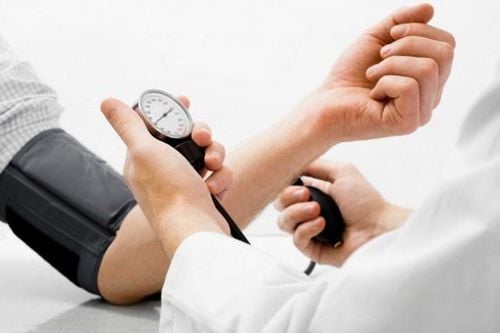
Uống quá nhiều rượu có thể làm tăng huyết áp lên mức nguy hiểm, hãy ngừng uống rượu sớm
2.9. You'll avoid getting sick Just one excessive intake can impair your body's ability to fight germs for up to 24 hours. Over time, large amounts of alcohol weaken the immune system and the body's ability to repair itself. Limit your alcohol intake so you can better prevent disease.
2.10. Lower your blood pressure If you drink a lot of alcohol and your blood pressure is too high, you can bring your numbers back to normal by doing one simple thing: quit drinking. Even just cutting back on drinks can be hugely profitable. Talk to your doctor about your blood pressure readings.
2.11. Make your brain work better Alcoholism can make it harder to think or remember things. Over time, heavy drinking can blur your perception of distance and volume, or slow and impair your motor skills. It can even make it difficult to read other people's emotions. But if you quit, your brain seems to be able to regain some of these abilities.
2.12. Eat less in the evening Wine and beer contain many calories. Drinking a lot of alcohol increases brain activity in the hypothalamus, making the body more sensitive to the smell of food.
2.13. Light skin color Alcohol causes the body to reduce the production of a hormone that absorbs water, causing dry skin.
Stop using alcohol, the skin will be healthy, reduce the bumps on the cheeks, the sides of the nose, dandruff, melasma.
2.14. Withdrawal If you are a heavy drinker, your body may rebel at first if you cut out alcohol. You may experience cold sweats or a rapid pulse, nausea, vomiting, hand tremors, and intense anxiety. Some people will even have seizures or see things that aren't there (hallucinations). Your doctor or substance abuse therapist will likely give you instructions and prescribe medication like benzodiazepines or carbamazepines to help you get over it.
Please dial HOTLINE for more information or register for an appointment HERE. Download MyVinmec app to make appointments faster and to manage your bookings easily.





